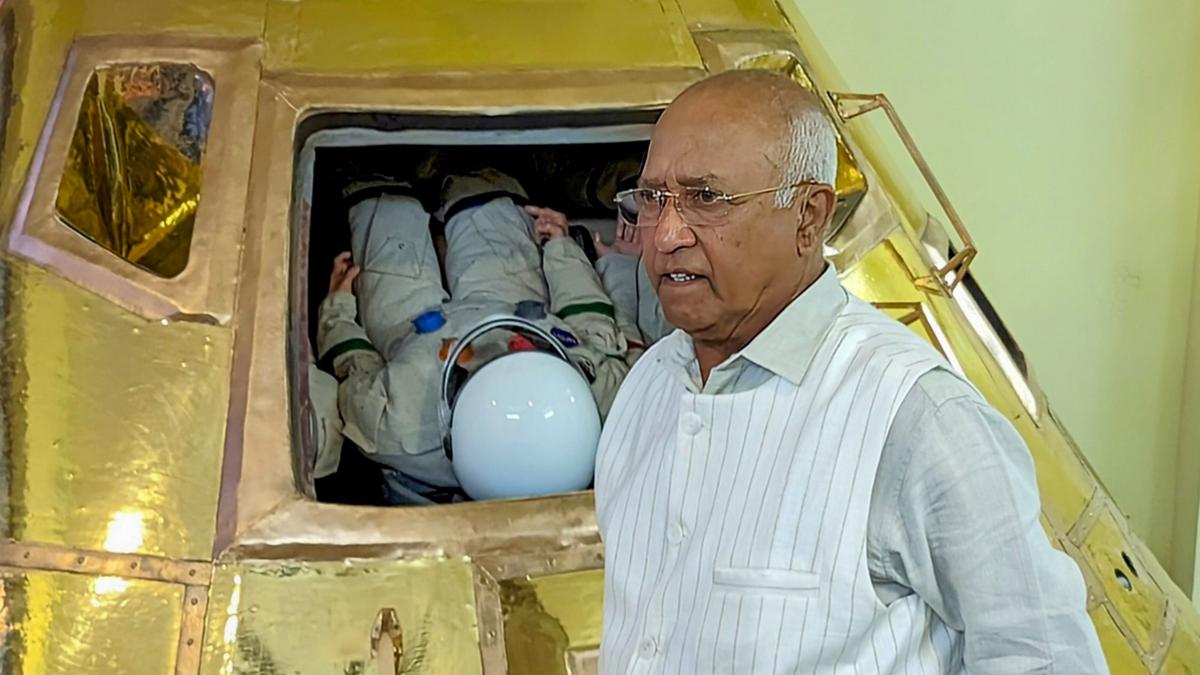Astronaut Rakesh Sharma, the first Indian to journey into space in 1984, said that space travel alters the mindset of humans, making them see the world from a perspective where “this planet belongs to everyone” and is not the sole preserve of anyone.
He shared his thoughts in a recorded podcast shared by the Ministry of Defence on the day India returned to space after 41 years, as Group Captain Shubhanshu Shukla from India and three other astronauts set forth on a landmark space odyssey on Wednesday (June 25, 2025).
Mr. Sharma had spent eight days in orbit in the erstwhile Soviet Union’s Salyut-7 space station in 1984.
The Axiom-4 crew, Pilot Shubhanshu Shukla of India, Mission Specialist Tibor Kapu of Hungary, Commander Peggy Whitson of the U.S., and Mission Specialist Slawosz Uznanski-Wisniewski of Poland, react as they greet their family members before their mission to the International Space Station, in Cape Canaveral, Florida, U.S., June 24, 2025.
| Photo Credit:
Reuters
Mr. Shukla scripted history by embarking on a space travel mission, along with three others from the U.S., Poland, and Hungary, to the International Space Station as part of a commercial mission by Axiom Space.
Sharma recollects historic flight
In the podcast released Wednesday night, Mr. Sharma, who had famously said, ‘Sare Jehan Se Acha...’ during his time in the orbit, said he was a test pilot in the Indian Air Force when the selection happened.
He later retired as wing commander from the IAF.
“Because I was a test pilot when the selection happened.. that time, I was young, I was fit, and I had the qualification, so I was lucky enough to have been chosen. Then, after selection, we moved to Star City, just outside Moscow, for our training.
Qualified cheer: The Hindu editorial on Shubhanshu Shukla, Axiom-4 mission
“The training went on for 18 months, which culminated in the Indo-Soviet spaceflight in 1984. It was an eight-day mission, and we carried out experiments which were designed by Indian scientists,” he said.
Mr. Sharma recalled that the entire training and communication with crew members and mission control while they were in orbit was in Russian.
“We had to learn the language before we started training, and that was not easy because of the paucity of time. So, we took about two months to learn the language,” he said.
Different era
While the Indo-Soviet spaceflight took place in an analogue era when very few owned a television, the Axiom-4 mission lift-off was watched by people on TV screens and mobile phones live across the globe.
After multiple delays, Elon Musk’s SpaceX launch vehicle with Crew Dragon spacecraft atop a Falcon-9 rocket blasted off from the Kennedy Space Center in Florida at 12:01 pm (IST) carrying mission pilot Shukla, former NASA astronaut Commander Peggy Whitson and mission specialists Tibor Kapu of Hungary and Slawosz Uznanski-Wisniewski of Poland.
“Kamaal ki ride thi (It was an amazing ride),” Mr. Shukla said 10 minutes after the Dragon spacecraft was placed in orbit around the Earth at an altitude of 200 km as part of the Axiom Mission 4(Ax-4).
In the podcast, Mr. Sharma, when asked how he felt watching the world and India from space, exclaimed, “Oh dear! Beautiful.” “In our country, we got everything: we got a long coastline, we got the ghats section, we got plains, we got tropical forests, we got mountains, Himalayas. It’s a beautiful sight, different colours, different textures,” he said.
Mr. Sharma said in space, days and nights are very unusual, as sunrises and sunsets happen at an interval of just 45 minutes.
Mental impact
He said while space travel technology has changed, “as humans, we haven’t changed much”.
“The mental impact will always be there because humans will be able to get a different perspective. It does kind of alter the world view… (shows) the vast place in universe,” the veteran astronaut said.
It changes the mindset, he emphasised.
The IAF, in a post on X, said Mr. Shukla has set forth on a landmark space mission, carrying the pride of the nation beyond Earth.
It also said, “This is a dèjà-vu moment for India, 41 years after the mission of Sqn Ldr Rakesh Sharma, who first carried our Tricolour beyond Earth. Being more than a mission – it is a reaffirmation of India’s ever-expanding horizon.”
Future of space travel
Asked about the future of Indian space travel, Mr. Sharma said, “We will be going farther and farther from planet Earth.”
“We really need to preserve what we have, which means we need to end conflicts, we need to forget about our weapons….this planet belongs to everyone, it is not a sole preserve,” he underlined.
Mr. Sharma added that space exploration will “keep marching ahead”.
“I am hoping that India will be a modern leader in the years to come, and India will succeed in its (space) mission, which I am quite confident we will,” he said.
Mr. Sharma said after his return from the mission, he went back to the Indian Air Force.
“And after few years, I moved to Hindustan Aeronautics Limited as their chief test pilot,” he said, and recalled his association with the evolution of the Light Combat Aircraft (LCA) ‘Tejas’.
